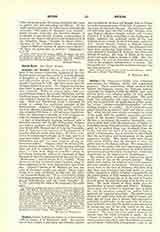

Guijon, ANDRE, bishop and orator; b. in November, 1548, at Autun; d. in September, 1631. He was the son of Jean Guijon, a physician and Oriental scholar, who travelled in the East and brought back to France a Greek manuscript copy of the New Testament, dating from the eleventh century. He had three brothers with more than one title to fame: Jacques, Jean, and Hugues, all three lawyers, writers, and savants. Philibert de la Mare, counsellor at the Parliament of Dijon, collected the principal works of the four brothers in one volume, in 4to of 612 pages, under the title “Jacobi, Joannis, Andreae et Hugonis fratrum Guiionorum opera varia” (1658). This contained both their prose works and Latin poems. Andre became vicar-general to Cardinal de Joyeuse, and afterwards Bishop of Autun. He went to Rome to be consecrated and came back to France in 1586. His “Remontrance a la cour du Parlement de Normandie sur l’octroy des sentences fulminatoires” is extant. Unfortunately his “Eloge funebre de Pierre Jeannin” has not been preserved.
J. EDMUND ROY

